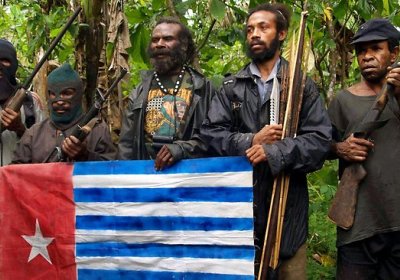Three West Papuan activists scaled the walls of the Australian consulate in Bali on October 6, during the APEC meeting on the island, to seek refuge and demand that foreigners be allowed to freely enter West Papua.
The Australian government, however, took the opportunity to reaffirm its long-standing support for Indonesia's occupation of West Papua.
Duncan Roden
A group of West Papuan asylum seekers arrived in Australia on September 24, defying the Australian government and potentially raising already high tensions between Australia and Indonesia over asylum seekers.
The group of West Papuans includes six adults and a child. It has been reported the group had some connection to the West Papua Freedom flotilla, in which supporters of freedom for West Papua tried to sail to the Indonesian-occupied territory. The flotilla sparked by Indonesian authorities on its West Papuan organisers.
The Australian government has made it clear that it will not offer consular help to activists on the West Papua Freedom Flotilla if they are arrested by Papua New Guinea NG or Indonesian authorities.
The flotilla is expected to enter Indonesian territory early next month. Carrying West Papuan and Australian Aboriginal activists, its aim is to raise awareness about the occupation of West Papua by Indonesia.
Prime minister Kevin Rudd’s announcement of the “PNG solution” — where refugees who arrive in Australia by boat will be denied resettlement and sent to Papua New Guinea — has sparked the largest refugee rights rallies in Australia since John Howard was in power, as well as opposition from within PNG itself.
On August 2, 2000 students at the University of Papua New Guinea (UPNG) held a protest against the proposed plan.
The United States government hopes that negotiations for the Trans-Pacific Partnership (TPP) will reach a final agreement this year. If completed, it will create the world’s largest “free trade agreement” — with serious consequences for the hundreds of millions of people living in the affected countries.
The 18th round of TPP negotiations will take place in Malaysia on July 15-25. This will be the first time Japan has taken part, joining the US, Australia, Singapore, New Zealand, Chile, Brunei, Canada, Malaysia, Mexico, Peru and Vietnam.
Greens Senator Richard Di Natale questioned foreign minister Bob Carr on June 5 during a senate hearing on human rights abuses in West Papua.
Like most sectors of society, the education system in Australia is under attack. For decades, education has been underfunded, so when Prime Minister Julia Gillard announced that she intended to fund the Gonski reforms, many people were temporarily relieved.
Then she said that, to pay for primary and high school education reforms, the government would cut funding to universities. Private schools won’t lose funding and, in some cases, will get more. Yet the ailing TAFE system would get nothing.
So much for an education revolution.
In West Papua, May 1 holds a special significance besides being the international day marking working-class struggle. It was on May 1, 1963, that Indonesia was granted control of the western half of the New Guinea island the by the United Nations.
Since then, many West Papuan independence and human rights activists have been jailed, tortured and killed for demanding real democracy and a genuine independence referendum. As thousands of people across the region prepared for May 1 demonstrations marking 50 years of brutal occupation, the Indonesian authorities launched raids on April 30.
Jailed WikiLeaks whistleblower and US soldier, Bradley Manning, was named on April 25 as the grand marshal in this year’s LGBTI Pride Parade in San Francisco. But, amid controversy and pressure, San Francisco Pride president Lisa Williams issued a statement the next day rescinding the honour.
Manning was elected by former grand marshals, who form an electoral college to choose a grand marshal each year. Other grand marshals are appointed by the SF Pride board and by a community vote. Grand marshals are chosen for making significant contributions to the LGBTI community.
International support for West Papua grows with push to include the occupied nation in regional body
West Papua has been gaining international support recently, especially in its pursuit of inclusion in the Melanesian Spearhead Group (MSG), a regional intergovernmental organisation that has supported the independence movements of its members.
Controversially, Indonesia, which has occupied West Papua for decades, has had observer status in MSG since 2011.
The ongoing strike at Sydney University attracted national media attention on March 26 when strike-supporting students were dragged from a lecture theatre by riot police.
The students were engaged in a “roaming picket” that was disrupting one of the few remaining classes held that day when police intervened. This sparked debate as to whether student supporters used appropriate tactics to make their presence heard.
Eight Indonesian soldiers were killed on February 21 in West Papua. The attacks were claimed by the armed wing of the Free Papua Movement (TPN-OPM).
The attacks came after a series of violent crackdowns by Indonesian authorities on a growing movement of peaceful protest by Papuans calling for end to Indonesian occupation and for self-determination.
In the first attack, a military post in Tingginambut, Puncak Jaya, was raided. One soldier was killed and another injured.
- Previous page
- Page 5
- Next page







